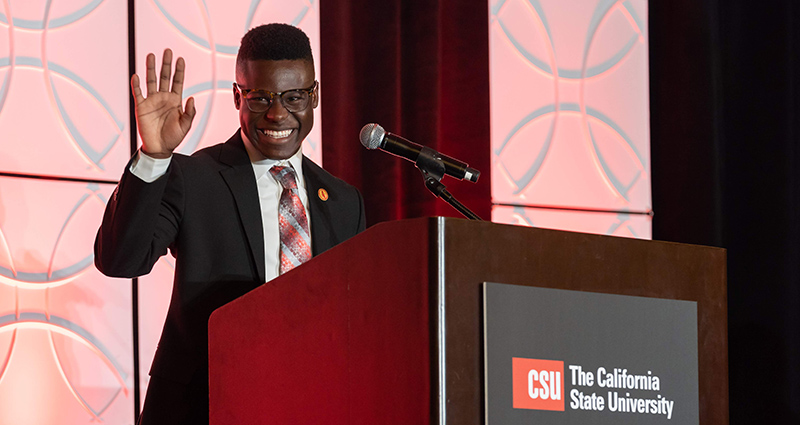
(Photo courtesy of Michael Wiafe)
California Forward is committed to advancing policy intersections that create a more inclusive and sustainable California where all people can prosper. To move this forward, we must address the racial and geographic inequities that have been exacerbated by a public health and economic crisis, and we must answer the call to dismantle structural racism. The Voices of Shared Prosperity series amplifies the stories of Californians who are committing their time and talent to solutions that embrace equity, the environment, and the economy.
“Regardless of the situation you were born into, you should still be able to pursue your dreams.” Michael Wiafe, the former president of the Cal State Student Association, says that this thought is the north star of his policy work.
Wiafe highlights the critical value that higher education and hard work has had on his family’s economic mobility, but he insists that the margin between success and limitation is too thin.
| California Dream Index Fact: A Californian born in 1940 had almost a 90% chance of out-earning their parents. Yet a child born in 1980 would have less than a 50-50 shot. |
|---|
| *Launching at the 2020 California Economic Summit, the California Dream Index is a tool that measures and tracks economic mobility. |
As a representative for the California State University student body throughout the state and the nation, Wiafe outlined in a recent CNN interview many of the distinct challenges students are facing in response to COVID-19. These challenges include general uncertainty about housing, lack of employment opportunities, loss of community, and uncertainty about the future of higher education. In response to these issues Wiafe supports empathetic policies that provide a holistic approach.
 Wiafe says many times policy discussions can be narrow in scope and he pushes to create a wide range of options to find comprehensive solutions. “We aren’t put in these positions not to do the work,” added Wiafe.
Wiafe says many times policy discussions can be narrow in scope and he pushes to create a wide range of options to find comprehensive solutions. “We aren’t put in these positions not to do the work,” added Wiafe.
Wiafe’s mother is Zambian and his father is Ghanaian. His parents immigrated from Ethiopia to pursue their education when he was only nine months old. He recalled many of the challenges they faced in creating a home in a new country for him and his siblings while being full-time students. Despite the hardships, he witnessed the near direct correlation between the economic mobility of his family and each advanced degree his parents received. He credits this experience with motivating his work ethic and his passion for higher education as a primary driver of socio-economic mobility.
While tenacity and education have been the foundation of success for his family, Wiafe also recognizes the impact of the strong social support systems that helped fill the gaps when additional support was needed. These networks helped his family navigate complex healthcare and education systems at very critical moments. Yet, he knows how lucky he and his family were to have these support systems, since for many the outcomes can be very different. Wiafe insists, “Our ability to chase our dreams should not be based on a gamble.”
Systematic barriers are formidable opponents to higher education. When asked what role the state can play in removing these obstacles, Wiafe provided the following recommendations:
- Integrate policies. Immigration, education, health, employment, and other policies should be connected. Policies should not be developed in isolation but rather should be prioritized by how they can complement each other to create wrap-around services that support the entire community member experience. In order to fully address the limitations of one policy area, relationships and correlations between intersecting policy areas should be understood.
- Support lifelong learning. Referring to a speech by Lande Ajose, senior policy advisor for higher education for the Office of Governor Gavin Newsom, Wiafe says “Education is a lifelong journey, but we don’t treat it as such.” He adds that, like healthcare, people need educational support throughout their life. He cites the age ceiling of 28 for Cal Grant eligibility as an example of a policy that decreases access to a lifelong learning model.
- Increase student support. The pandemic has challenged how we all function and, for students who are especially vulnerable, this might cause them not to return to classes. These are the students who need education the most and who will be critical in advancing economic mobility for the state. Wiafe highlights an increased emphasis on mentorship and mental health services as auspicious starting points for this effort.
- Create a sustainable funding model. Each year colleges and universities are waiting to see what the budget will look like and oftentimes last minute changes lead to funding gaps, which are pushed on to the students. Late-stage tuition increases, and financial aid adjustments severely impact the most vulnerable populations.
Wiafe is a member of the Young Leaders Advisory Council for the 2020 California Economic Summit. He will begin his master’s degree in public policy at UC Berkeley’s Goldman School of Public Policy in the fall. He continues to provide leadership and support on issues related to higher education and social equity, while creating a future where people are able to advance regardless of the circumstances in which they are born.
The Voices of Shared Prosperity stories will be shared in advance of the 2020 California Economic Summit, taking place on December 3-4.

